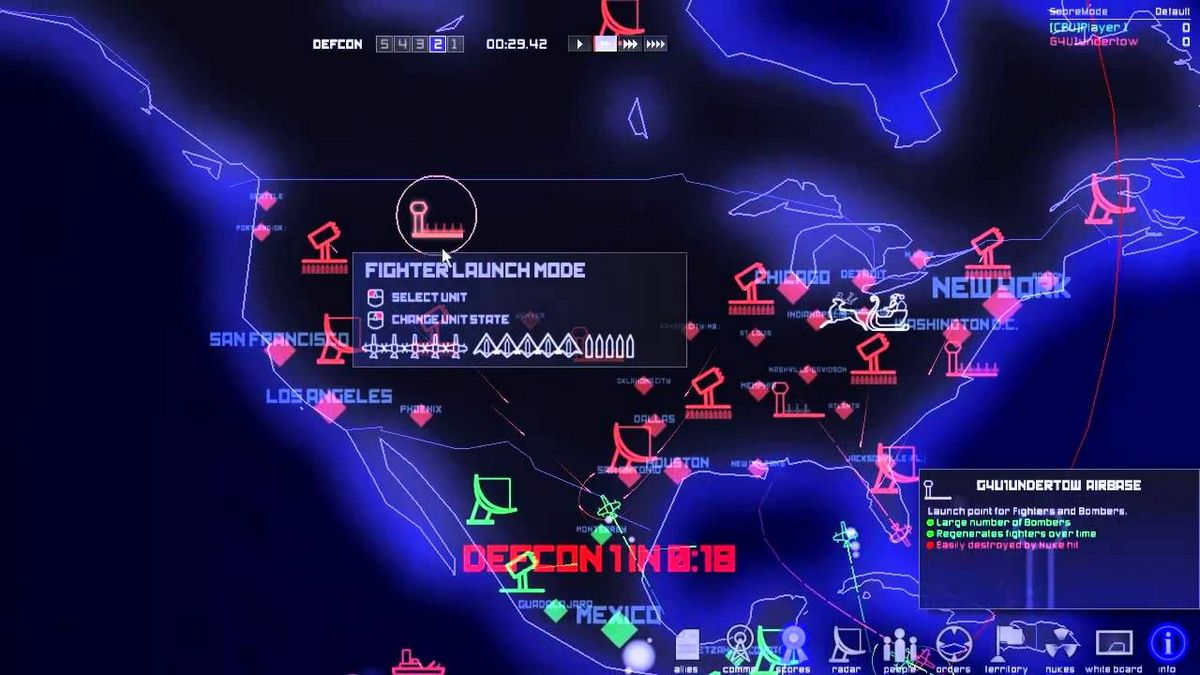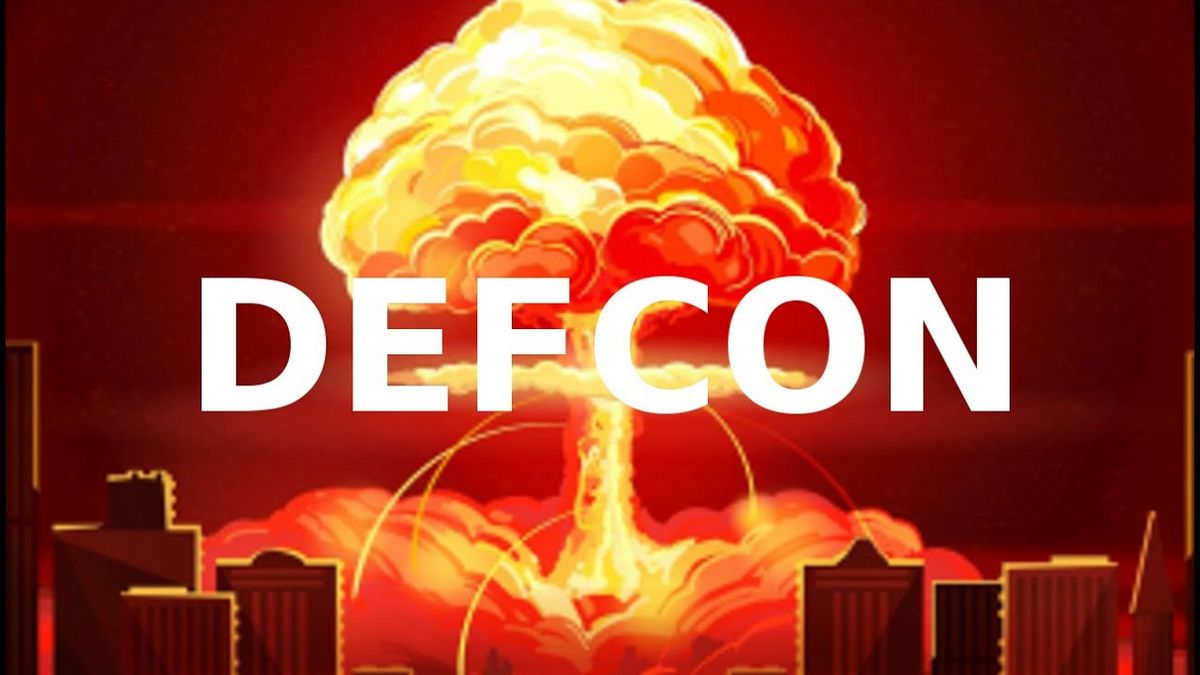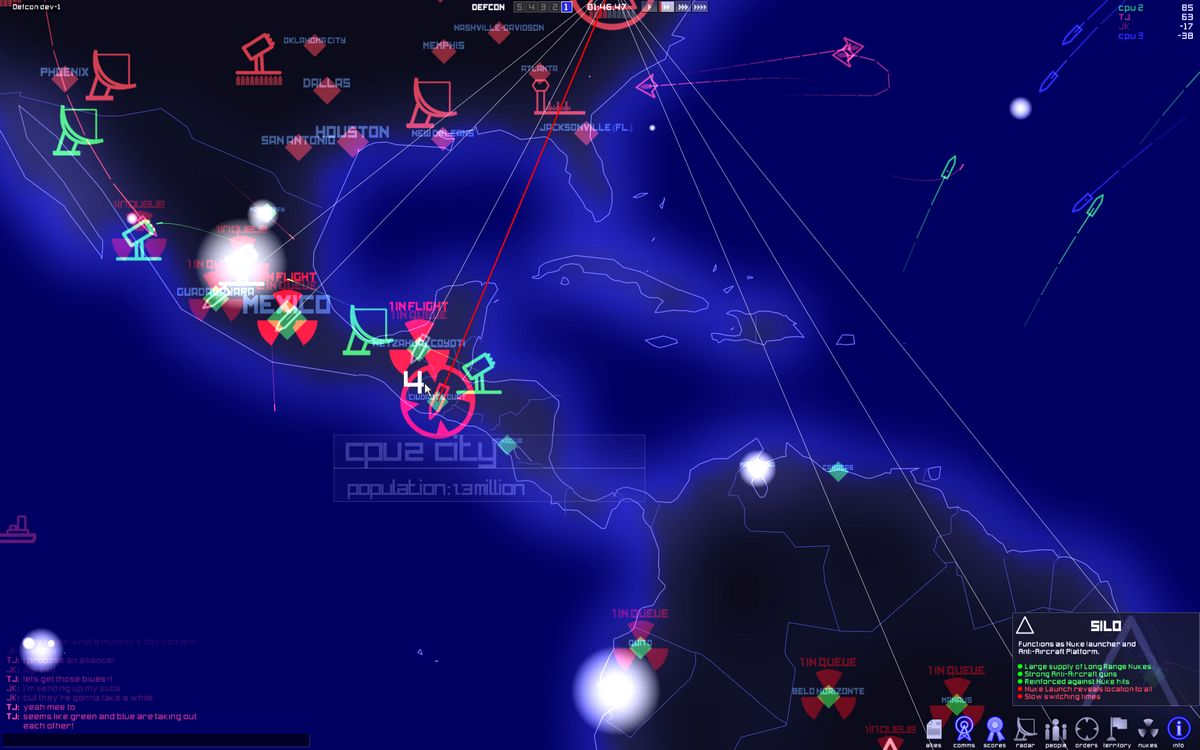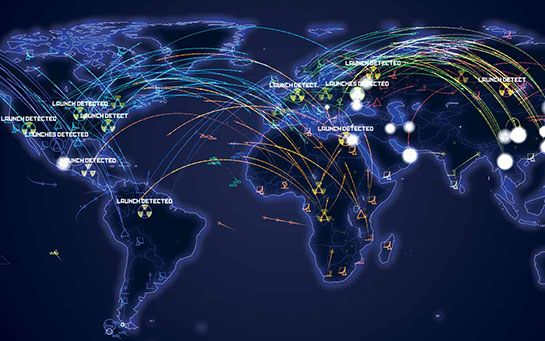DEFCON: Everybody Dies is a real-time strategy game that simulates the global thermonuclear war between major world powers. Developed by Introversion Software, this unique and immersive gaming experience challenges players to make strategic decisions that could ultimately determine the fate of humanity. As tensions escalate and nuclear arsenals are deployed, players must navigate complex political landscapes, deploy military forces, manage resources and ultimately choose when to launch their devastating strikes.

The gameplay features a minimalist interface with retro graphics and sound effects reminiscent of Cold War-era technology. Players can take on various roles such as commander-in-chief, fleet admiral or air marshal in charge of different regions around the globe. With only five minutes until complete annihilation at DEFCON 1, every decision counts as players race against time to outmaneuver their opponents before mutually assured destruction becomes inevitable.
This article examines DEFCON: Everybody Dies from multiple angles- its historical context, gameplay mechanics, user interface design elements and player experience- aiming to provide an in-depth understanding of how this game has managed to capture the attention of strategy gamers worldwide despite being almost a decade old.
- Understanding the mechanics of DEFCON: Everybody Dies – A strategic guide
- The psychology behind nuclear war simulation in video games
- The historical context and relevance of DEFCON: Everybody Dies
- Analyzing the game’s impact on popular culture and media depictions of nuclear war
- Multiplayer strategies in DEFCON: Everybody Dies – An analysis
Understanding the mechanics of DEFCON: Everybody Dies – A strategic guide
The mechanics behind DEFCON are based on military tactics and strategic decision making. The game‘s objective is to destroy enemy territories while defending your own, all while minimizing civilian losses.
Understanding the mechanics of DEFCON requires an in-depth comprehension of military strategies such as deterrence, pre-emptive strikes, and counterattacks. Players must carefully allocate resources and strategically position their forces across different regions to ensure maximum efficiency in warfare.
The game also incorporates psychological elements by emphasizing the importance of bluffing and misdirection. In DEFCON, players can set fake targets or feign weakness to lure opponents into exposing their true capabilities before launching major attacks.

Ultimately, mastering the mechanics of DEFCON involves practicing critical thinking skills and adapting quickly to changing situations. Effective communication with allies is also crucial for success in this multiplayer game where alliances can shift rapidly. With its combination of challenging gameplay mechanics and innovative design features, DEFCON offers a unique gaming experience that rewards those who can think strategically under pressure.
The psychology behind nuclear war simulation in video games
Games like DEFCON: Everybody Dies provide players the opportunity to engage with complex scenarios related to international conflict, diplomacy, and warfare. These simulations are designed to invoke a sense of realism that allows players to experience what it may be like to make decisions during a global crisis.
One psychological theory that helps explain why people enjoy playing these types of games is called “terror management theory.” According to this theory, individuals who are reminded of their own mortality become more anxious about their place in the world. Playing games where death and destruction are omnipresent can serve as a form of escapism for some people by allowing them to confront their fears indirectly.
Another theory prominent in discussions around nuclear war simulation gaming is “moral decision-making.” This idea posits that gamers must sometimes confront difficult moral dilemmas within such games when faced with choices between sacrificing an ally or risking one’s own interests. Although these game scenarios have no real-world impact on society, they do allow gamers the unique chance at considering various ethical positions regarding war and peace.
In conclusion, understanding the psychology behind nuclear war simulation video games sheds light on our fascination with engaging with disturbing subjects through interactive media platforms. While many argue over whether this type of entertainment desensitizes users towards violence or exacerbates anxiety surrounding global conflicts – there still remains much debate amongst researchers on both sides of this topic.
The historical context and relevance of DEFCON: Everybody Dies
The historical context of DEFCON is deeply rooted in the fear and tension that surrounded global politics during the 1960s, when the United States and Soviet Union were engaged in an arms race and had their fingers on the trigger of mutually assured destruction.
The game draws its name from the Defense Condition (DEFCON) system, which was used by military planners to determine levels of readiness for potential conflicts. This adds a level of authenticity to DEFCON’s gameplay mechanics as players must strategize around different defense postures such as Defcon 5 (peacetime), all the way up to Defcon 1 (nuclear war).
One could argue that this game has relevance today with ongoing tensions between world powers like North Korea, Russia, and China. In fact, some analysts have pointed out similarities between current events and the brinksmanship tactics portrayed in DEFCON. Overall, DEFCON: Everybody Dies offers a unique look into one of humanity’s most devastating threats while also providing valuable insights into history and human nature.
Analyzing the game’s impact on popular culture and media depictions of nuclear war

It has had a significant impact on popular culture, as it provides an interactive simulation for what was once only discussed in academic and governmental circles. The game’s focus on strategic planning and decision-making also mirrors real-world scenarios, making it an effective tool for education.
In terms of media depictions of nuclear war, DEFCON brings attention to the consequences and complex nature of conflict between nations possessing nuclear weapons. It highlights the reality that there are no “winners” in such situations – everyone loses when lives are lost and cities destroyed. This message is particularly relevant given recent political tensions surrounding nuclear capabilities.
The popularity of games like DEFCON can be seen as both positive and negative – on one hand, they raise awareness about important issues related to international security; on the other hand, they risk normalizing violence as entertainment. However, overall analysis suggests that these games contribute more positively than negatively to popular culture by creating dialogue around pressing global issues while maintaining an entertaining aspect for learning purposes. As long as players understand that this isn’t just another shooter game but rather a critical thinking exercise regarding real-life events with actual consequences then DEFCON serves its purpose well in educating people about critical global matters without desensitizing them towards violence or advocating for war itself .
Multiplayer strategies in DEFCON: Everybody Dies – An analysis
The game provides multiple modes of gameplay, including Diplomacy, Alliance, and Free-For-All. Each mode demands different strategic approaches from the player.
One critical aspect of effective DEFCON strategy is resource management. Players must allocate resources carefully, balancing military power with economic development while also ensuring adequate defense mechanisms are in place for their territories.
Another crucial element of successful multiplayer play in DEFCON is communication between allies. Clear and prompt communication can enable effective coordination against enemy forces as well as provide essential intelligence on opponent tactics and movements.
Finally, timing plays a significant role in determining the success or failure of a player’s strategy. Choosing when to launch attacks or initiate diplomatic overtures can be just as important as deciding where to do so. Skillful timing allows players to gain advantages over their opponents and tilt the balance towards victory.
Overall, mastering these key elements – resource management, communication, and timing – will give any DEFCON player a significant edge over their competition while playing multiplayer matches!
In conclusion, DEFCON: Everybody Dies is a complex and thought-provoking game that explores the themes of nuclear war, strategy, and human survival. Designed to simulate a realistic nuclear conflict scenario, the game challenges players to make difficult decisions under pressure while grappling with the moral implications of mass destruction.

Featuring highly detailed graphics and an intense soundtrack that captures the tension and fear associated with global warfare, DEFCON: Everybody Dies offers an immersive experience that is both engaging and educational.
However, it’s important to note that despite its entertainment value, this game serves as a solemn reminder of the destructive power of nuclear weapons. As such, it may not be suitable for all audiences.
Overall, DEFCON: Everybody Dies stands out as a unique and innovative gaming experience that pushes boundaries in terms of gameplay mechanics while also offering valuable insights into geopolitics and international relations.
Read More:- Score Big with World Soccer Winning Eleven 6 International: A Thrilling Game Experience!.
- Experience the Best of Cricket with Brian Lara International Cricket 2007 Game (69 characters).
- Explore the post-apocalyptic world of S.T.A.L.K.E.R.: Shadow of Chernobyl in this thrilling game.
- Rev up for adrenaline-fueled fun with Game Test Drive: Eve of Destruction – the ultimate driving experience!.
- Get Ready for Action-Packed Warfare with Call of Duty 4: Modern – The Ultimate Game!.
- Conquer Japan's Feudal Era in Nobunaga's Ambition: Rise to Power Game – Unleash your Strategic Prowess!.
- Experience History in Game Form: Making History – The Calm and the Storm.